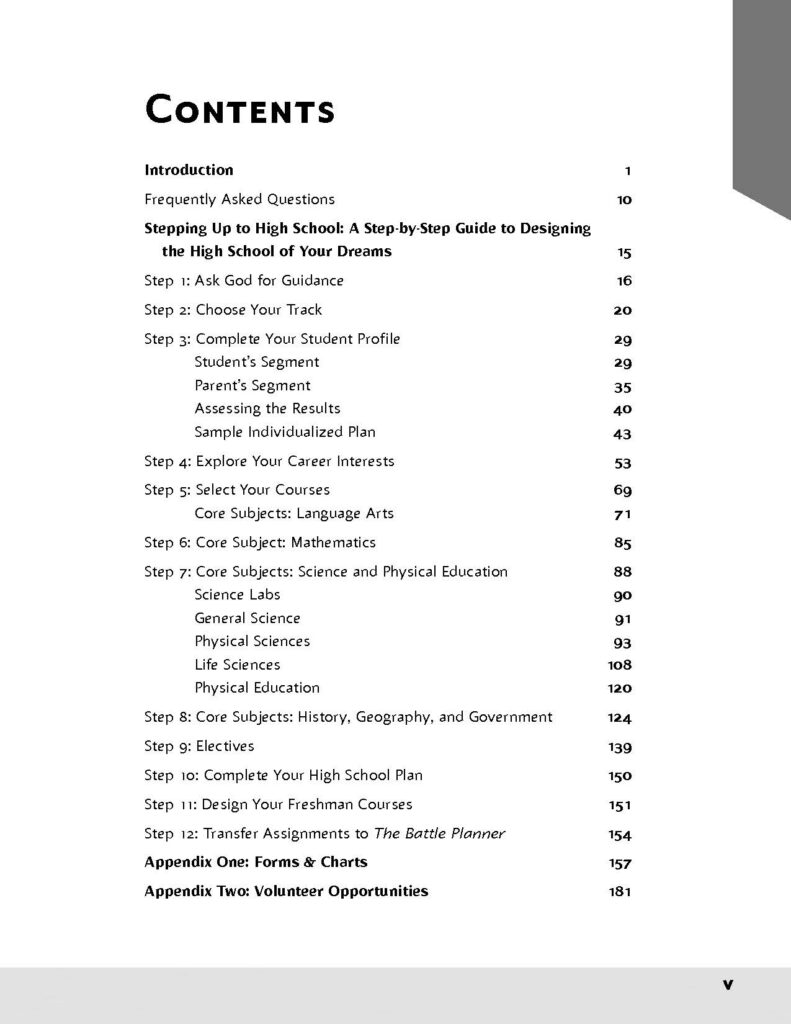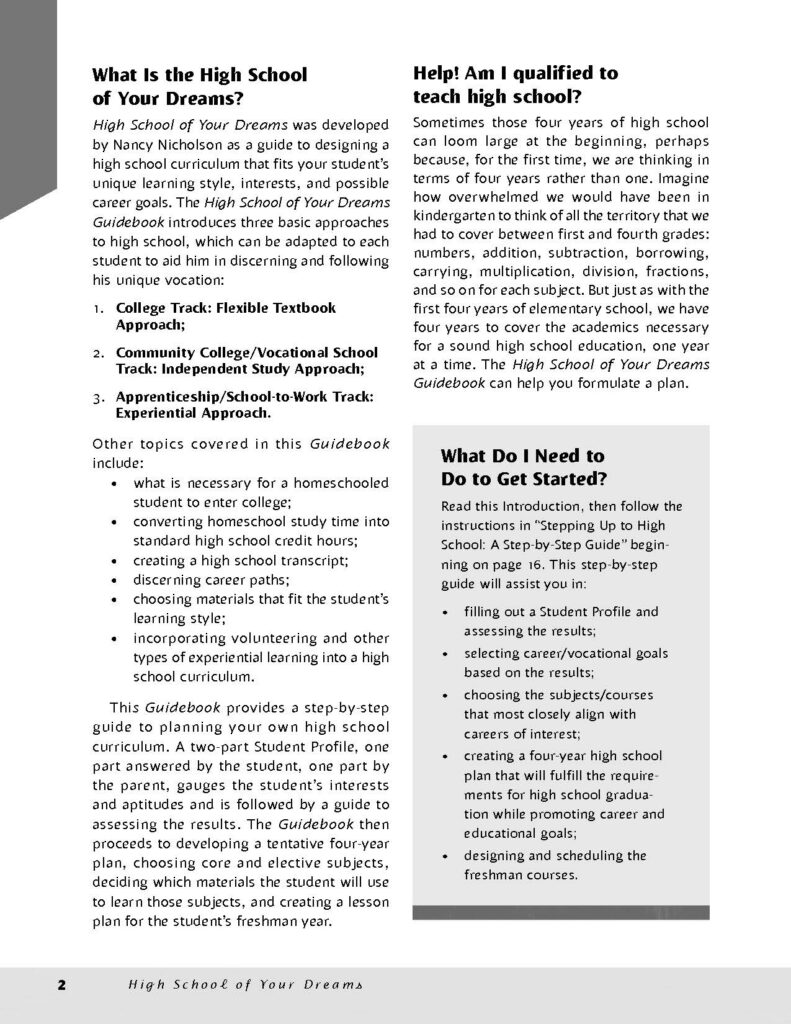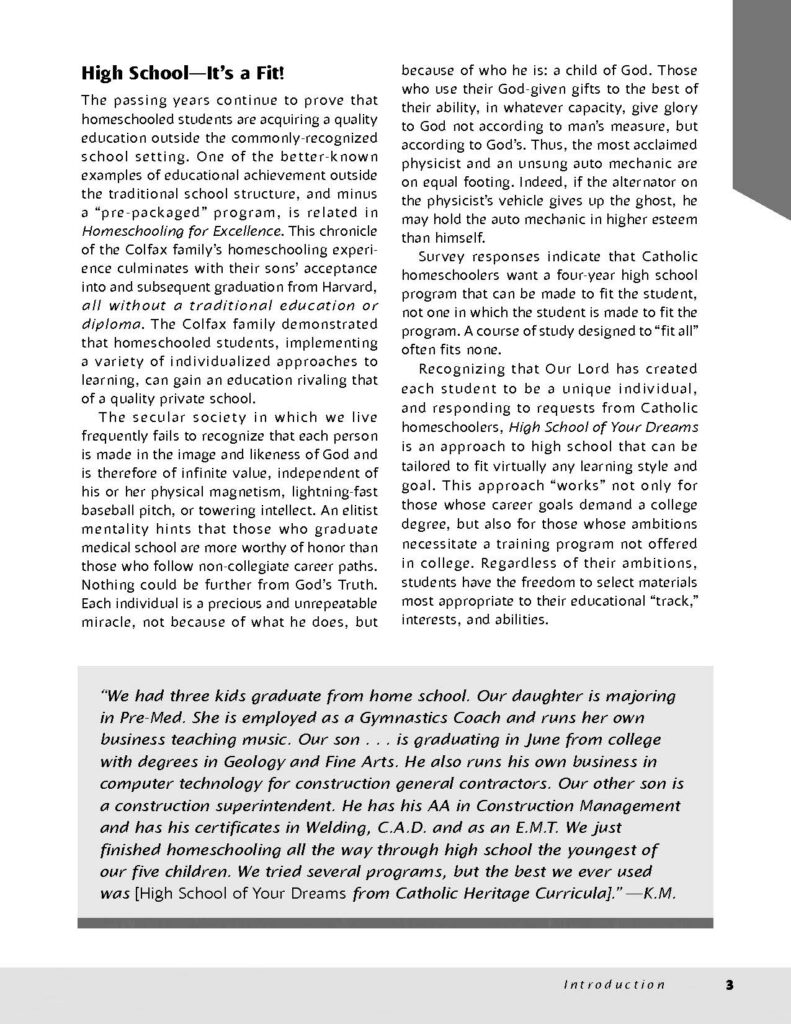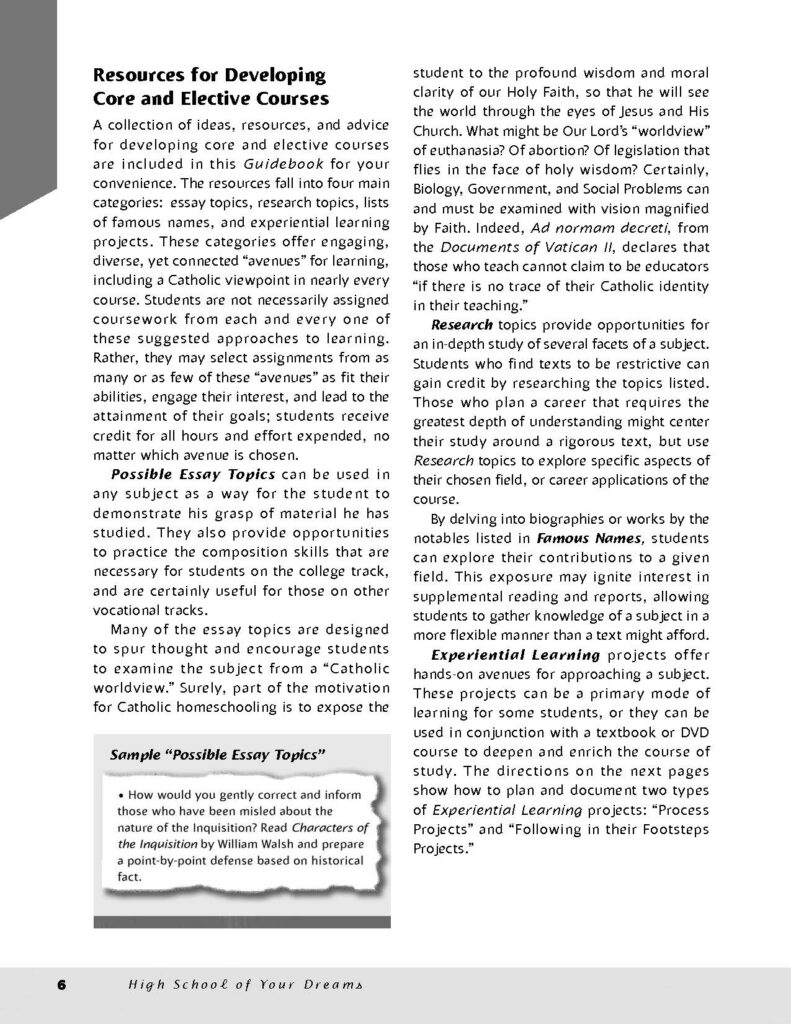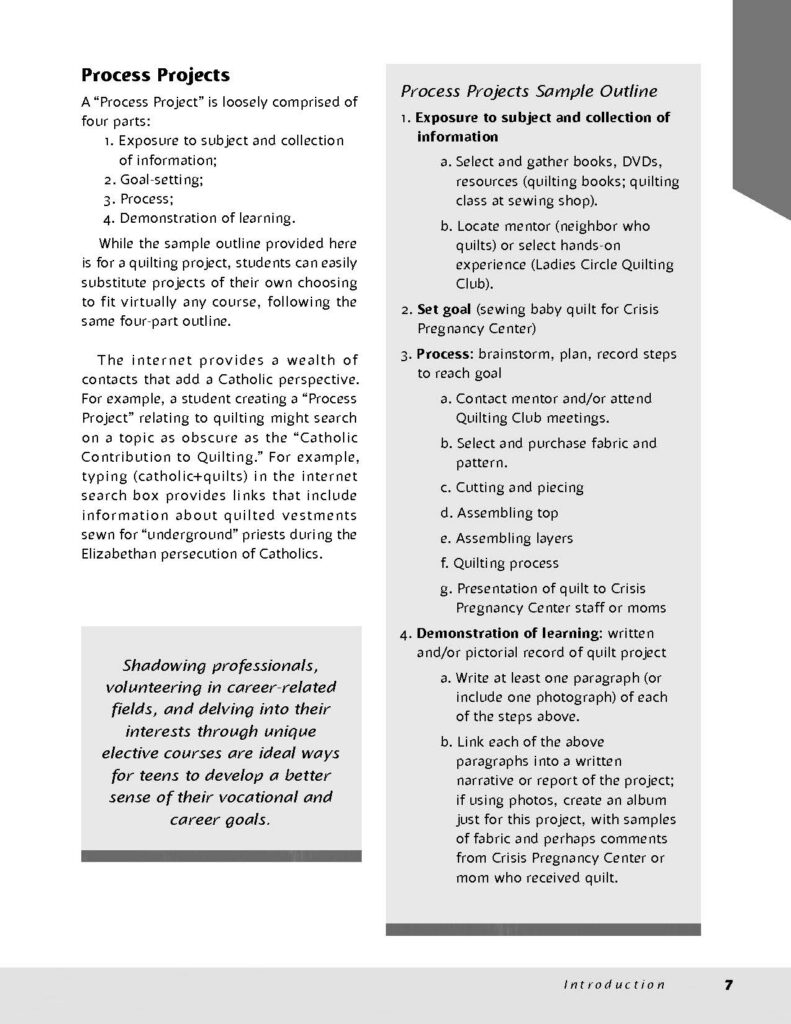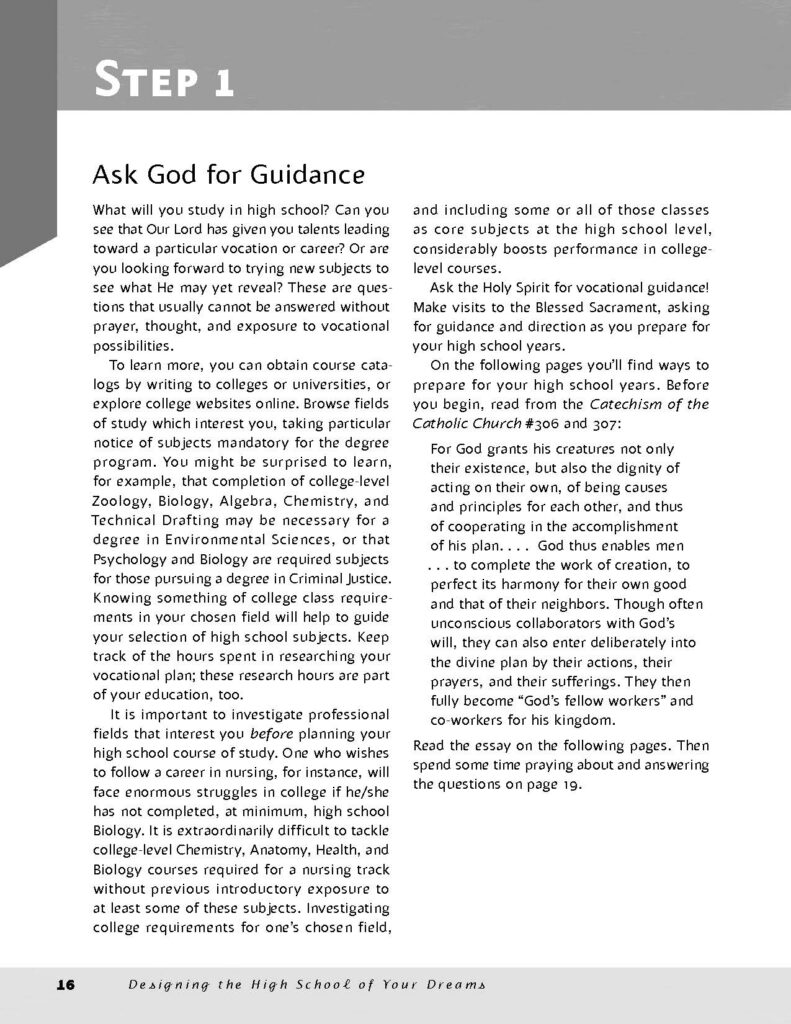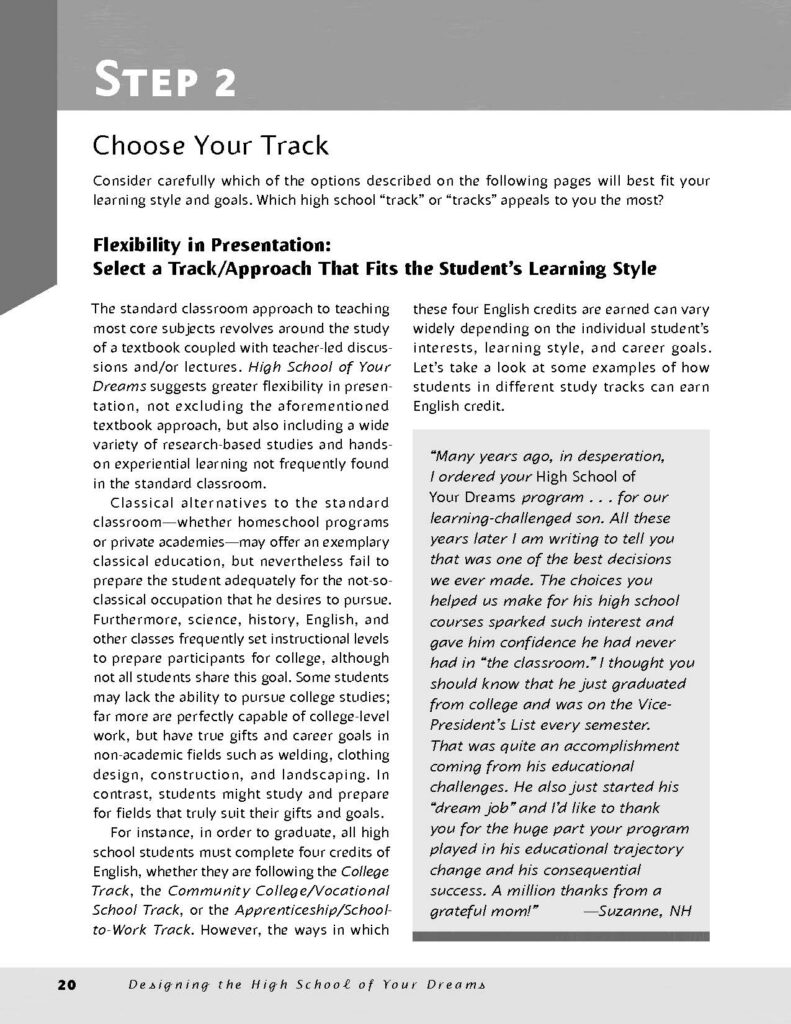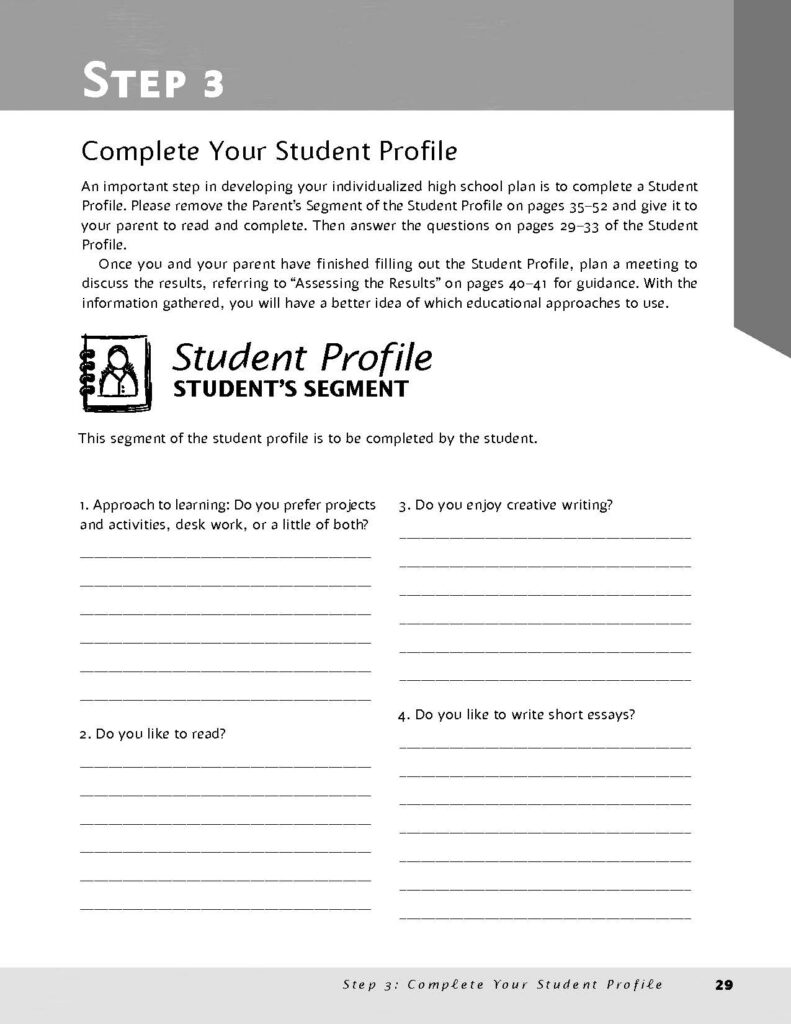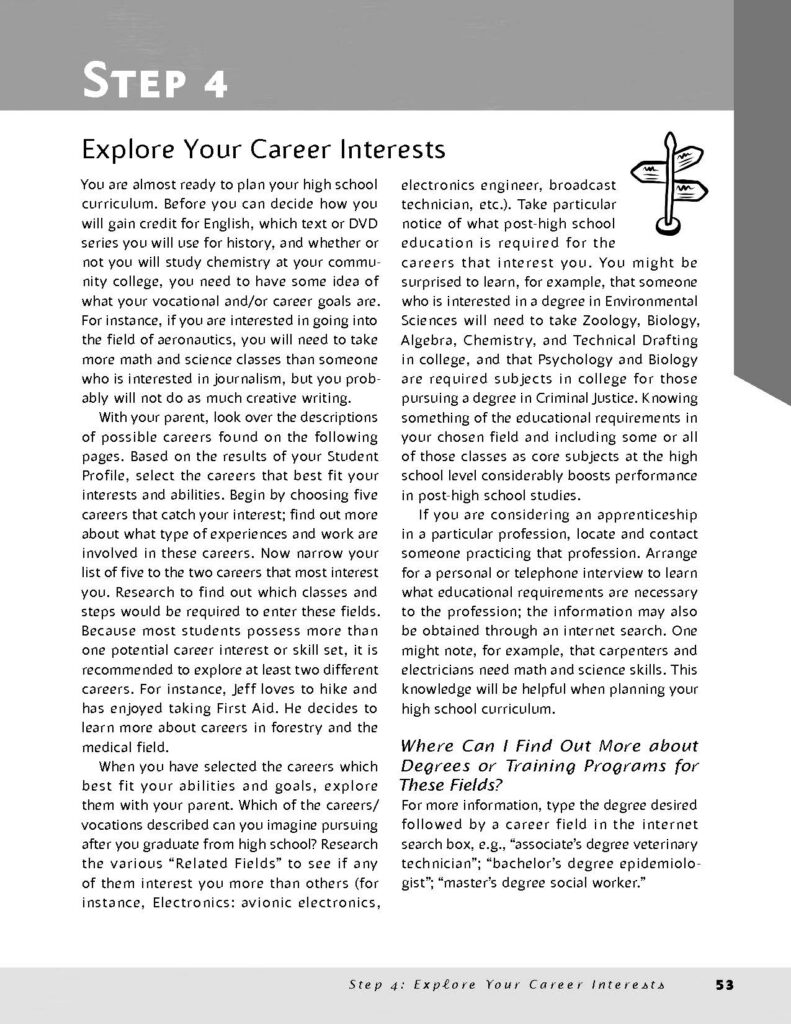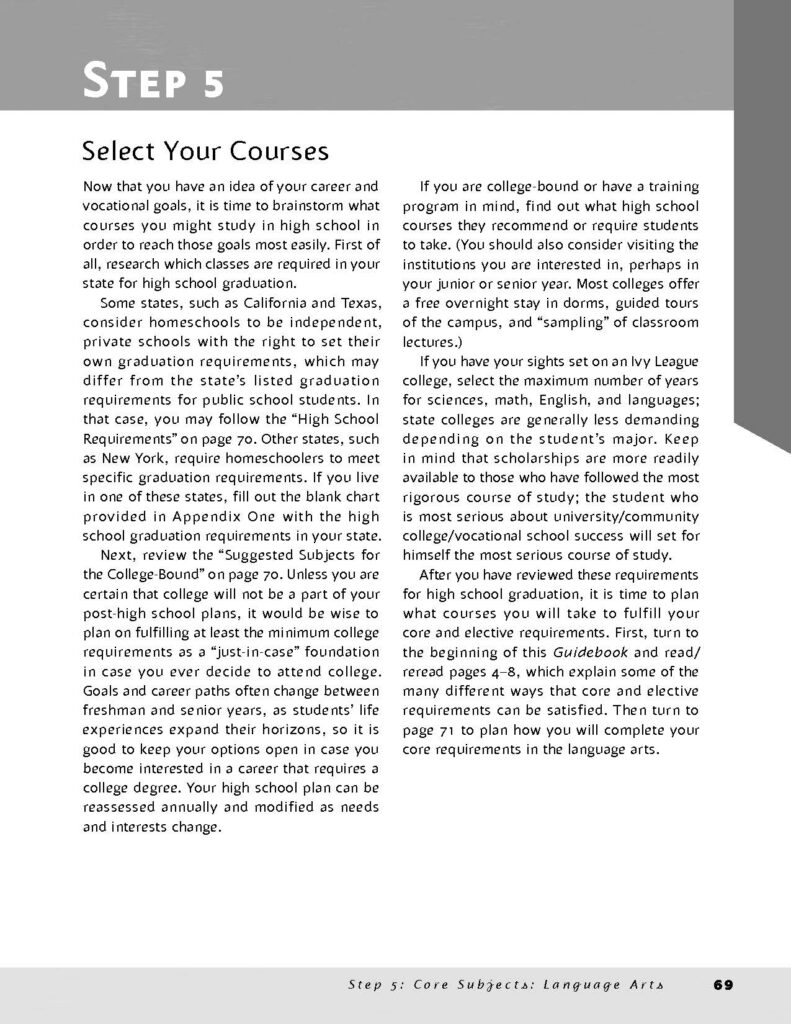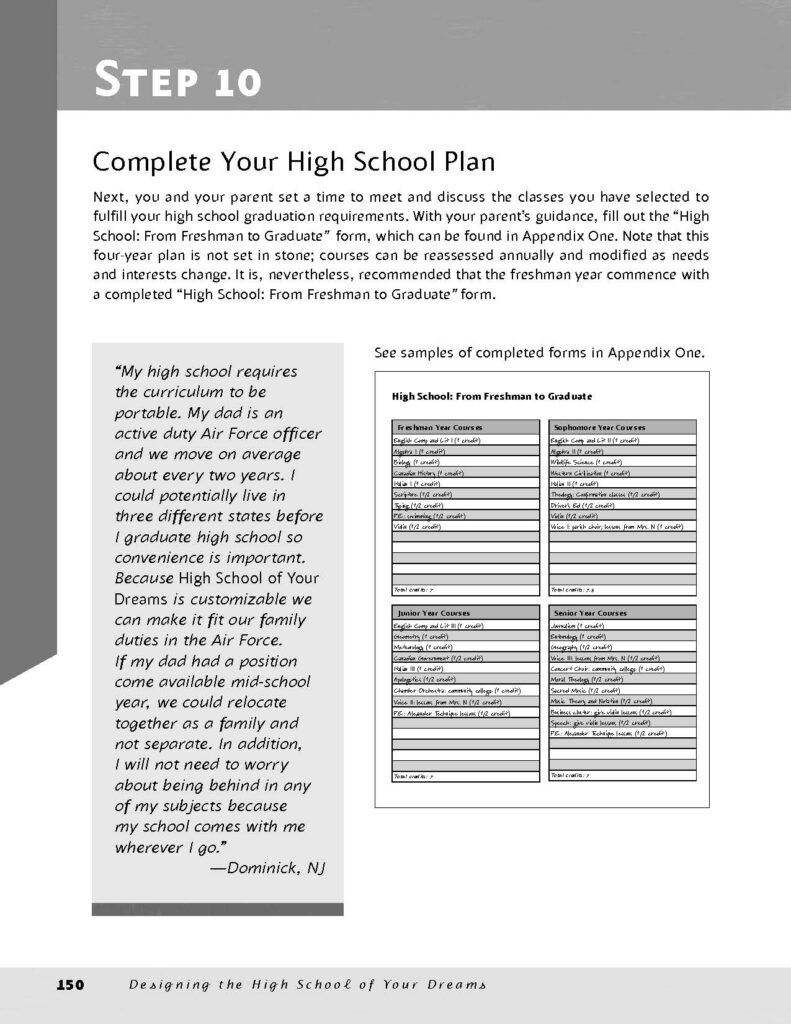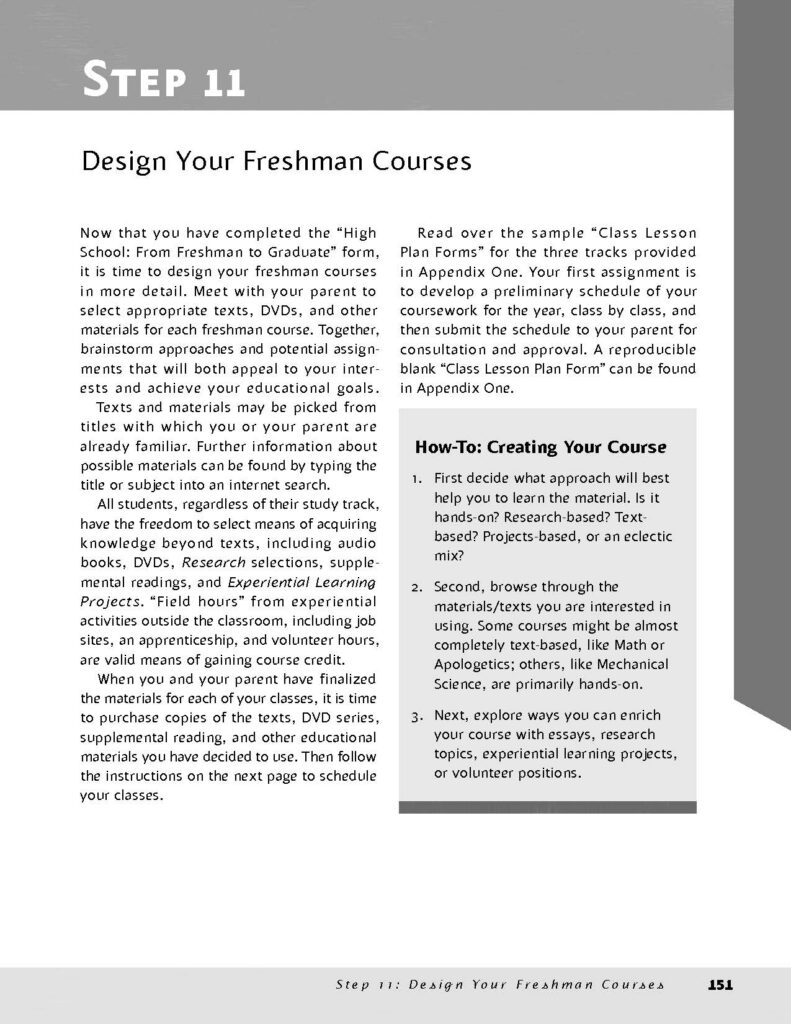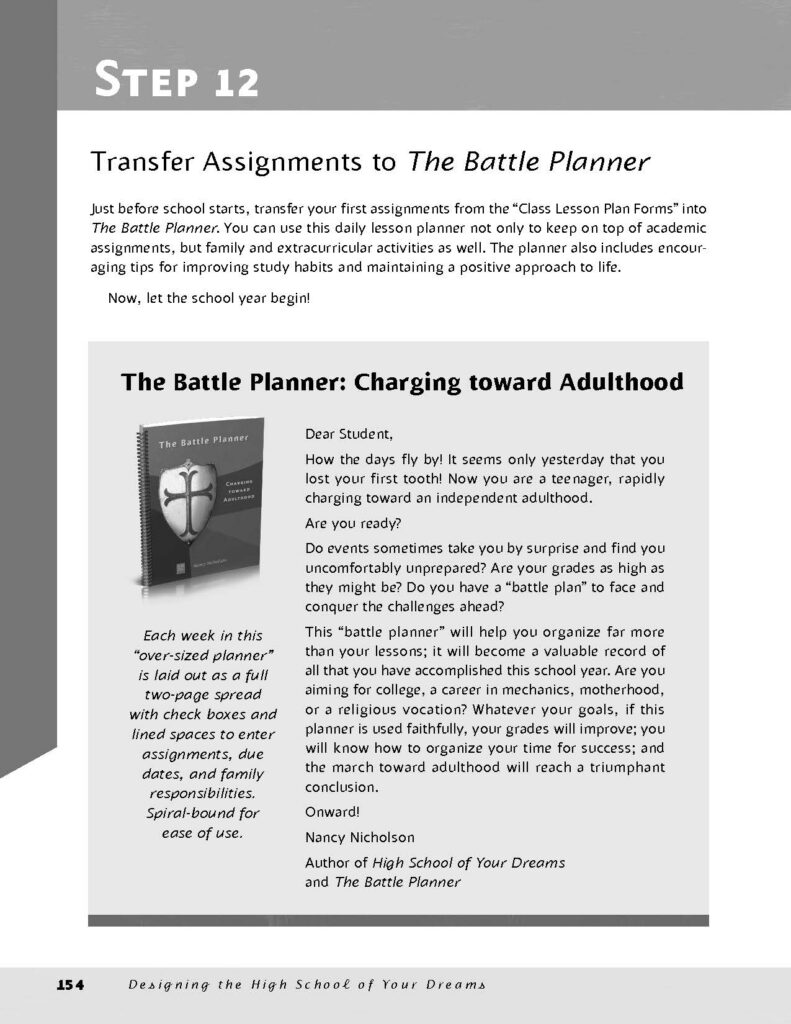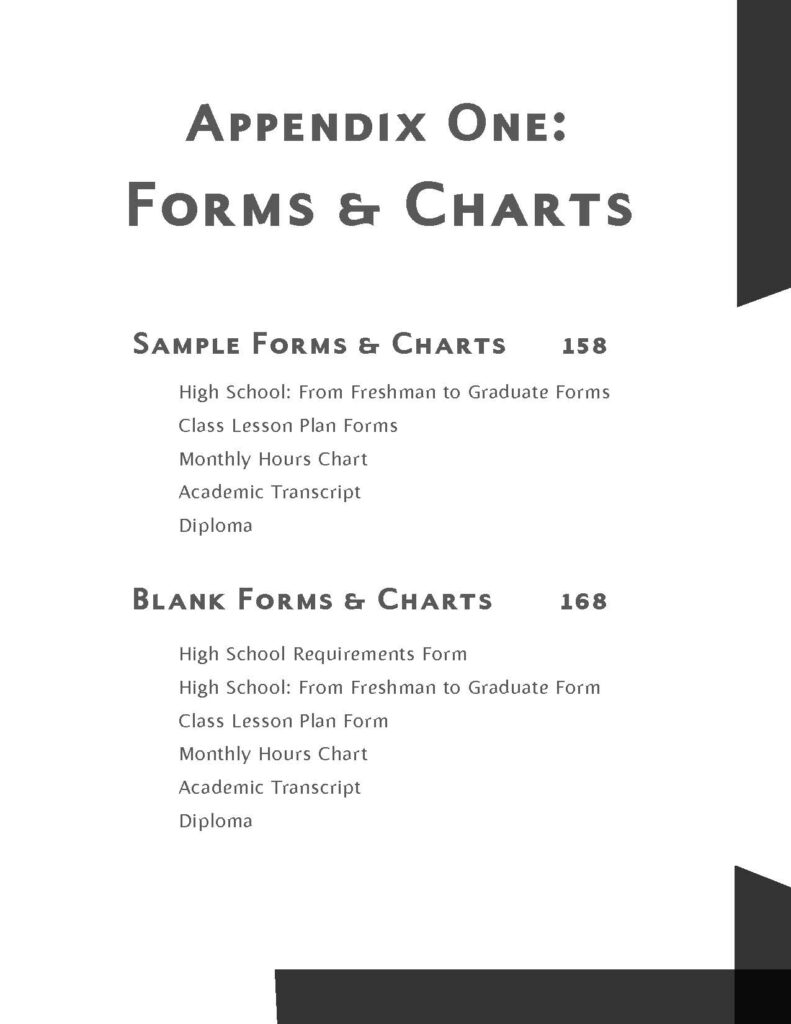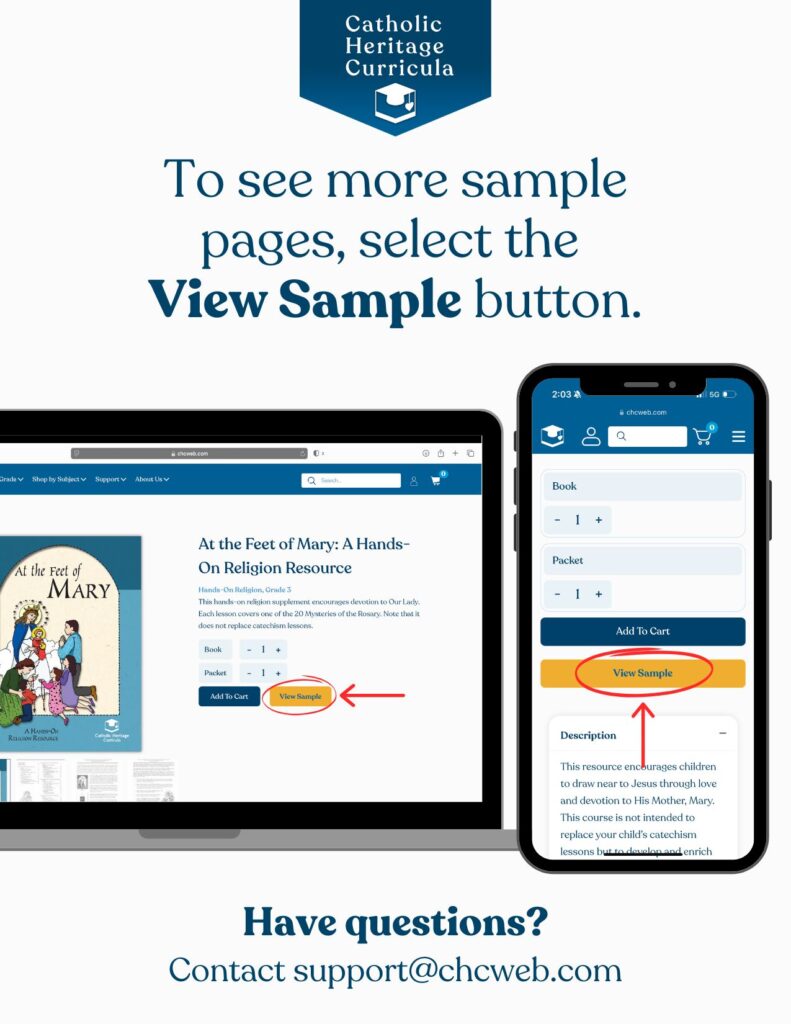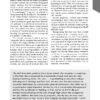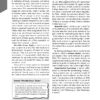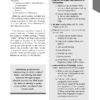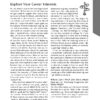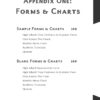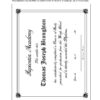The High School of Your Dreams Guidebook is a step-by-step guide to planning your own high school curriculum to fit your student’s unique learning style, interests, and possible career goals. The High School of Your Dreams Guidebook introduces three basic approaches to high school:
- College Track: Flexible Textbook Approach
- Community College/Vocational School: Independent Study Approach
- Apprenticeship/School-to-Work: Experiential Approach
A two-part Student Profile, one part answered by the student and the other by the parent, gauges the student’s interests and aptitudes and is followed by a guide to interpreting the results. The Guidebook then leads you in developing a tentative four-year plan, choosing core and elective subjects, deciding which materials the student will use to learn those subjects, and creating a lesson plan for the materials.
The Guidebook also covers the following general topics about homeschooling through high school:
- What is necessary for a homeschooled student to enter college
- Converting homeschool study time into standard high school credit hours
- Creating a high school transcript
- Discerning career paths
- Incorporating volunteering and other types of experiential learning into a high school curriculum
Organizational resources in the Guidebook include these reproducible blank forms and charts:
- From Freshman to Graduate Chart
- Class Lesson Plan Form
- Monthly Hours Chart
- Academic Transcript
- Diploma
It is recommended that planning for high school begin as the student nears the end of eighth grade. Early planning will help the student to focus on his or her goals—building excitement for the coming high school years—and will give time for course and material selection.
The High School of Your Dreams Guidebook is included in the Eighth Grade Core Kit. A daily schedule for using the Guidebook to create a high school plan is available in CHC Lesson Plans for Eighth Grade.
Product Code: HSYD-GB
Format: Softcover
Binding: Loose-leaf, 3-hole drilled
Page Count: 186 pages
Dimensions: 8.5″×11″
ISBN: 9780983683278
Returnable? No, view return policy.
Consumable? Yes, purchase one per student.
Answer key: None required.
Nancy Nicholson is one of the founding authors of Catholic Heritage Curricula. Equipped with an abundance of God-given talent, a major in Secondary Education–English, and years of experience homeschooling her own children, she has written over thirty educational titles, beginning with Little Stories for Little Folks. Her unique ability to develop programs and workbooks that “fit” both advanced and struggling students is due to her experience raising children of different ability levels and learning styles: two of her children are developmentally challenged, while another went on to graduate from Cornell and is now a college professor.
Q: Does the Guidebook provide complete high school lesson plans?
A: No, the Guidebook is meant to support and guide the parent and student as they develop their own lesson plans for unique high school courses.
Q: Does CHC offer grading or keep records for me?
A: CHC is not a school; therefore, we do not provide grading or record keeping. Delegating the task of grading to someone else robs the student of the immediate feedback which is a key benefit of homeschooling, and hinders the parent’s efforts to tailor the curriculum into a “perfect fit” for the individual student. While waiting for a grading service to return the grades, the student continues to falter in weak areas, or suffer boredom from unnecessary assignments in areas already mastered.
Instead, students using High School of Your Dreams keep track of their study hours using the “Monthly Hours Chart.” Each year’s classes are then listed on the student’s high school transcript along with the grade assigned for the class as a whole.
Students are also encouraged to create portfolios of significant high school course work, activities, and accomplishments. An “activity and project” portfolio is an effective means of documenting accomplishment not only to a potential employer, but also for high school graduation and college admissions, especially when coupled with SAT/ACT scores.
Q: Frankly, I am worried about transcripts and diplomas for college acceptance. Don’t I need to be enrolled with a school that will furnish these?
A: In a word: no.
Essentially, most universities ask simply that students keep and provide a detailed description of their high school curriculum, but neither require that students follow a prescribed or approved homeschooling program nor provide formal transcripts.
Rather than formal transcripts and diplomas, most colleges and universities look instead at a prospective student’s SAT and ACT scores, and for a clear sense of intellectual growth and a quest for knowledge. Many colleges and universities go so far as to state that homeschooled students sometimes have a potential advantage over non-homeschooled students, as they have enjoyed the freedom to pursue their own, independent course of study.
Q: We have been using another program for high school for the past two years, but would like to switch to High School of Your Dreams, as it seems a better fit for us. Can we do this without losing credit or having to start all over again?
A: Absolutely. Any credits earned thus far may be applied to High School of Your Dreams for complete credit. It’s as simple as including all previously-earned credits in your student’s high school transcripts when he begins High School of Your Dreams
Q: Are homeschoolers accepted to college without an accredited diploma?
A: Catholic homeschoolers for years have been accepted without accredited diplomas, not only at Catholic institutions like Franciscan University of Steubenville, the University of Dallas, and Thomas Aquinas College, but in secular colleges across the United States. In place of a diploma, institutions measure ability by PSAT, SAT, and ACT scores, and gather information on student coursework, transcripts, accomplishment, and community volunteer activity documented in portfolios provided by the family. While admission requirements differ among colleges, homeschooled students are routinely accepted into college based on these test scores and family-provided proof of education.
Colleges also accept students who, instead of presenting a high school diploma, demonstrate their ability to compete at the college level by successfully completing a few classes at a local community college before transitioning to a four-year college. Another option for transitioning from high school is the GED. Graduates have used the GED, in conjunction with SAT/ACT scores and without, as a springboard into the armed forces, vocational schools, community colleges, and universities.
Remember that an accredited diploma alone is no guarantee that a student will be accepted by a college; conversely, the student with solid SAT scores and a portfolio brimming with evidence of a motivated young adult will likely be welcomed at university, diploma or not.
Q: How do I know that I am grading my high schooler’s work properly?
A: This answer comes from Sandra Garant, certified teacher, veteran homeschooler, attorney, and author:
Some parents do not grade their high school student’s school work. Others grade selectively, choosing not to grade each assignment, but looking at the big picture of how their student is doing. So how do we know our children are learning?
Let’s consider written papers first. Sometimes, my basic program for grading a written report would be grammar and spelling, neatness, organization of thought, and extent and use of research. Sometimes, I might be more interested in the question: does this writing show an improvement over the last paper? Is the student’s writing ability progressing? Or instead of grading the paper, I might ask a high schooler to read the paper aloud and critique her own work. What does she think needs improvement? What are the strong areas? What did she do well? Then I would allow her to rewrite the paper and save the revision as an example of her best work. When a professional writer applies for a position, whoever is hiring is not interested in grades, but in examples of past work. The college admission essay will probably be more important than your daughter’s high school English grade. Colleges understand that grading is subjective and varies from teacher to teacher. How you choose to grade depends upon the purpose of the assignment and your child’s ability.
Those of us who did not grade our children in high school found proof of our children’s learning in their conversations and in their projects. My family talked a lot about what we were doing, reading, drawing, and so on. I also observed my children at play and at work. My children worked for a few years as backstage technicians and actors for a local playhouse. The directors would tell me what a great job they were doing, and I could see this for myself during their performances. They were even given free acting lessons because the acting coach wanted them to assist him with the younger children. A key moment was when they concluded that acting careers were not going to be their goal. They enjoyed acting and learned a great deal but could see that this was not what they wanted.
High school is a productive time for many homeschoolers. They can produce works of quality and continue improving their skills. Their work can go well beyond grades. Students may enter art, photography, quilt, woodcarving, or cooking competitions. They may submit writing for publication. They may redecorate your house; plant a butterfly garden; write computer programs; repair appliances; write and act in plays; volunteer at crisis pregnancy centers, animal shelters, political headquarters; and so on. These projects and productions will generate lots of discussion. By listening to your child, you will develop an awareness of what her weaknesses and strengths are. In fact, you may need to prevent her from evaluating herself and her work too harshly, reminding her that she is still learning and that gaining competency takes time.
If your state requires regular grading and you are willing to grade selectively, then ask your daughter to self-evaluate her work and discuss weekly or monthly grades based upon completion of projects and papers. Before beginning a project or paper, decide why you are grading and use that as a basis for giving a grade to major works.
Please do not feel overwhelmed by grading. Veteran teachers will tell you that there is no one right way to grade. Discussing how you will grade work with your daughter will benefit both of you, and at different times, you may choose different ways or reasons for grading.
Related Products
If you like the featured item on this page, you might be interested in the related materials below.


